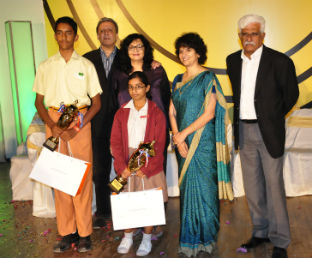Basava In You: A Unique Pop-Rock-Metal Idiom
Oct 11, 2019, 11 24 | Updated: Oct 11, 2019, 11 24
Talk about keeping up with the times: a 12th-century poet’s works find a new voice
A Bangalore-based family seems to have found an innovative way to bridge the generation gap.
Vinay Shindhe grew up listening to – and accompanying – his father as he performed the poetry (vachanas) of 12th-century Kannada saint Basava. When he noticed his own daughter, Amrapali, showing a successful interest in Western-style singing, he didn’t want her to forget the folk tunes that she grew up with. So he repackaged the Kannada lyrics into a format that he thought would win more listeners.
‘Basava In You,’ is an album released recently, and features Basava’s vachanas using a variety of rock and pop genres, from fusion to death metal.
While the idea of working with his knowledge of Basava’s vachanas had been brewing for some time, the entire project took shape over a short three week period, said Shindhe in an interview recently at his home. He planned to launch the album to coincide with Basava Jayanti celebrations (May 13).
Within three weeks, he and Amrapali had put together a band (called ‘The Alaap’), set vachanas to new tunes, and recorded them over three days in a studio.
It may come as a surprise that neither has trained formally in music: while Vinay’s exposure comes from accompanying his father in folk songs, Amrapali’s comes from singing in choirs at school – and, it appears, had a natural proclivity for song, ever since she was five or six years old.
“Whenever guests would come home,” recalls Monalisa Shindhe, Amrapali’s mother, “she would say, ‘Papa, please tell them that I’m going to sing’. Even though her voice wasn’t fully developed, we would always let her sing. ‘Hum ko man ki shakti dena,’ that was the one she’d always sing.”
In the album, Amrapali brings a Western style and accent to the Kannada – and, occasionally, English – lyrics. Did she think about singing in a traditional style? “There are hundreds of girls in Bangalore who can sing that way,” says the 16-year-old. “But I chose to retain my style.”
Considering the breadth of their subjects, it’s something of a surprise that vachanas have typically been confined to the concert hall or the devotional-music circles.
Basava’s passionate spiritual quest forms only one part of his vachanas: the poems offer everything from life advice. ‘Kalabeda, kolabeda’ to simple, beautiful images and even occasional social commentary. ‘The rich will make temples for Shiva. What shall I, a poor man, do? My legs are pillars, The body the shrine, the head a cupola of gold.’
Vinay’s passion for the form is infectious. His journey with the vachanas began, he says, simply because his father sang the songs of Basava – and not necessarily through a religious connection. “The messages of the vachanas are so strong that they appealed to me,” he says. “Unfortunately it’s restricted to slightly older people. If you see the messages in the vachanas, their meaning is so deep.”
He illustrates, “Take any message. Kalabeda kollabeda (do not rob, do not kill) – why do we need to sing this only in a light music or classical context?
Listening to the six-track album leaves no doubt that that newer listeners will come into the ambit. ‘Ivanarava Ivanammava,’ becomes a pop-rock ballad rich with wailing guitar and hummed harmonies set to a standard four-beat rhythm. And then there’s the funky, bright strum of a guitar that opens Dayavillada dharma.’ If your taste leans towards heavy metal, there’s ‘Kalabeda Kolabeda,’ complete with raging drums and dark guitars.
Many of the songs feature verses in English: indeed, singing the vachanas in English is key to Vinay’s vision. “If a song like Michael Jackson’s ‘We Are The World’ can become so popular, why not messages like Basava’s ‘Kalabeda, Kolabeda’? That’s how we need to spread the word.”
The move to sing in English is also encouraged by the Basava Samiti, he says, because they recognise the power of English in spreading the word.
Future projects for the father-son duo will include, songs sung completely in English (with lyrics translated by the Basava Samiti). “Our journey will continue,” says Vinay. But for now, he’s simply content with what’s been done so far: “At least our children know the complete vachanas now.”
Our reviewer rates this (XX/5)







